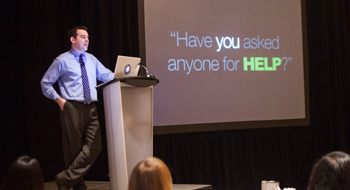

Check email, answer the phone, finish a proposal and watch the latest viral YouTube video—all in an hour’s work, right? Tod Maffin, president of engageQ digital, says the need to multi-task constantly is having a negative impact on productivity.
Increased workload doesn’t necessarily mean a more productive workplace, he said during his keynote presentation at the Benefits Canada Mental Health Summit in Toronto on November 8. “Multi-tasking isn’t about what you are holding in your hand, it’s about what’s going on upstairs,” he says.
And Maffin knows first-hand how detrimental juggling multiple duties or tasks can be.
See photos from the 2012 Mental Health Summit – Toronto.
Maffin was once a fast-moving CEO of a publicly traded digital company during the Web 1.0 boom and simultaneously a host of a technology radio show on CBC Radio One. Although he was successful, Maffin wasn’t happy, and his physical and his mental health were teetering dangerously on an unhealthy edge. And then he fell. He suffered a mental breakdown, but after shrugging that off, too, he started powering through 18-hour days with the help of a bottle of red wine and Polar Ice vodka.
Today, Maffin has his depression and alcoholism under control but attributes much of what caused his fall to the pressure he felt to perform. “Try as we might, we are just not conditioned to work like that,” he said.
Although many employers have programs in place that encourage work/life balance, in the age of doing more work with less resources, employees are getting mixed messages. To help employees avoid a fate like Maffin’s, he suggests that employers consider instituting the following into their culture.
Encourage teamwork – One of the things Maffin learned in rehab is the power of asking people for help—a simple action that is profoundly lacking in our business culture. “It’s often seen as a sign of weakness. Workplaces should encourage a culture where asking for help is rewarded.”
Abolish presenteeism – It’s great to give employees vacation days or personal days, but if they feel they are too busy to use them, it’s counterproductive. Maffin says the way to “abolish presenteeism” is to encourage a healthy work/life balance and not make people feel as if they need “to pull a Ferris Bueller” to get a day off.
Focus on results – Recognize that hours spent at a desk don’t directly correlate to productivity and results. As president of his company, Maffin focuses on results and doesn’t care when people do the work, as long as it meets delivery dates. “Society rewards business. There is no incentive to work more efficiently or smarter, just to work more.”
